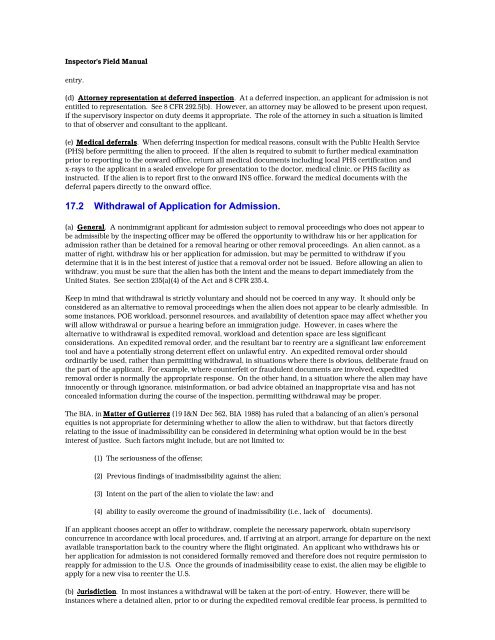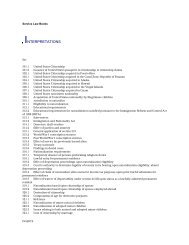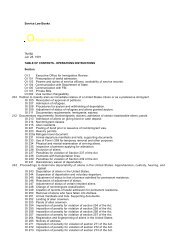You also want an ePaper? Increase the reach of your titles
YUMPU automatically turns print PDFs into web optimized ePapers that Google loves.
<strong>Inspector's</strong> <strong>Field</strong> <strong>Manual</strong><br />
entry.<br />
(d) Attorney representation at deferred inspection. At a deferred inspection, an applicant for admission is not<br />
entitled to representation. See 8 CFR 292.5(b). However, an attorney may be allowed to be present upon request,<br />
if the supervisory inspector on duty deems it appropriate. The role of the attorney in such a situation is limited<br />
to that of observer and consultant to the applicant.<br />
(e) Medical deferrals. When deferring inspection for medical reasons, consult with the Public Health Service<br />
(PHS) before permitting the alien to proceed. If the alien is required to submit to further medical examination<br />
prior to reporting to the onward office, return all medical documents including local PHS certification and<br />
x-rays to the applicant in a sealed envelope for presentation to the doctor, medical clinic, or PHS facility as<br />
instructed. If the alien is to report first to the onward INS office, forward the medical documents with the<br />
deferral papers directly to the onward office.<br />
17.2 Withdrawal of Application for Admission.<br />
(a) General. A nonimmigrant applicant for admission subject to removal proceedings who does not appear to<br />
be admissible by the inspecting officer may be offered the opportunity to withdraw his or her application for<br />
admission rather than be detained for a removal hearing or other removal proceedings. An alien cannot, as a<br />
matter of right, withdraw his or her application for admission, but may be permitted to withdraw if you<br />
determine that it is in the best interest of justice that a removal order not be issued. Before allowing an alien to<br />
withdraw, you must be sure that the alien has both the intent and the means to depart immediately from the<br />
United States. See section 235(a)(4) of the Act and 8 CFR 235.4.<br />
Keep in mind that withdrawal is strictly voluntary and should not be coerced in any way. It should only be<br />
considered as an alternative to removal proceedings when the alien does not appear to be clearly admissible. In<br />
some instances, POE workload, personnel resources, and availability of detention space may affect whether you<br />
will allow withdrawal or pursue a hearing before an immigration judge. However, in cases where the<br />
alternative to withdrawal is expedited removal, workload and detention space are less significant<br />
considerations. An expedited removal order, and the resultant bar to reentry are a significant law enforcement<br />
tool and have a potentially strong deterrent effect on unlawful entry. An expedited removal order should<br />
ordinarily be used, rather than permitting withdrawal, in situations where there is obvious, deliberate fraud on<br />
the part of the applicant. For example, where counterfeit or fraudulent documents are involved, expedited<br />
removal order is normally the appropriate response. On the other hand, in a situation where the alien may have<br />
innocently or through ignorance, misinformation, or bad advice obtained an inappropriate visa and has not<br />
concealed information during the course of the inspection, permitting withdrawal may be proper.<br />
The BIA, in Matter of Gutierrez (19 I&N Dec 562, BIA 1988) has ruled that a balancing of an alien's personal<br />
equities is not appropriate for determining whether to allow the alien to withdraw, but that factors directly<br />
relating to the issue of inadmissibility can be considered in determining what option would be in the best<br />
interest of justice. Such factors might include, but are not limited to:<br />
(1) The seriousness of the offense;<br />
(2) Previous findings of inadmissibility against the alien;<br />
(3) Intent on the part of the alien to violate the law: and<br />
(4) ability to easily overcome the ground of inadmissibility (i.e., lack of documents).<br />
If an applicant chooses accept an offer to withdraw, complete the necessary paperwork, obtain supervisory<br />
concurrence in accordance with local procedures, and, if arriving at an airport, arrange for departure on the next<br />
available transportation back to the country where the flight originated. An applicant who withdraws his or<br />
her application for admission is not considered formally removed and therefore does not require permission to<br />
reapply for admission to the U.S. Once the grounds of inadmissibility cease to exist, the alien may be eligible to<br />
apply for a new visa to reenter the U.S.<br />
(b) Jurisdiction. In most instances a withdrawal will be taken at the port-of-entry. However, there will be<br />
instances where a detained alien, prior to or during the expedited removal credible fear process, is permitted to




